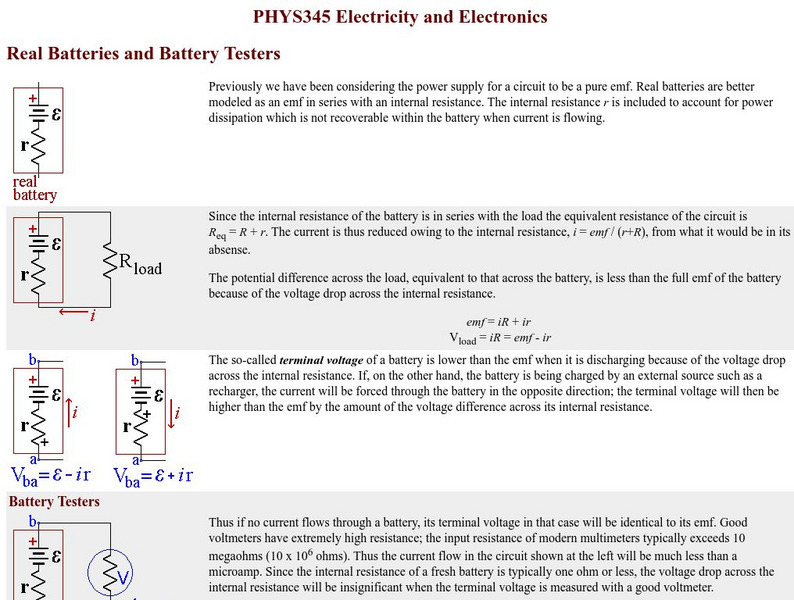Khan Academy
Khan Academy: Dc Ammeters and Voltmeters Review
Review the key terms and skills related to voltmeters and ammeters, including where to place them in a circuit.
Science and Mathematics Initiative for Learning Enhancement (SMILE)
Smile: Batteries and Bulbs
For the teacher planning a instructional activity or for the student preparing for a project or presentation. This page describes an activity in which parallel and series circuits are constructed using batteries and bulbs. Complete...
Science and Mathematics Initiative for Learning Enhancement (SMILE)
Smile: Electron Current Flow
A teacher lesson plan which could be easily converted into an idea for a student project or presentation. This page describes an activity in which the water-electricity analogy is used to investigate the relationship between current,...
Massachusetts Institute of Technology
Mit: Open Course Ware: Current, Resistance, and Power
Learners investigate current, resistance, and power. Some topics explored in the activities are Ohm's law, electrical power, and solving circuits. The resource consists of video clips, lecture notes, online textbook chapters, exam...
American Association of Physics Teachers
Com Padre Digital Library: Open Source Physics: Faraday Disk Dynamo Model
This simulation demonstrates a rotating conducting disk in a magnetic field which produces a current or a self-exciting dynamo.
Khan Academy
Khan Academy: Dielectrics Article
This article from Khan Academy provides information about dielectrics. This information is intended for the Class 12 Physics Course (India).
National High Magnetic Field Laboratory
Magnet Academy: Jack Kilby
The integrated circuit fueled the rise of microelectronics in the latter half of the twentieth century and paved the way for the Information Age. An American engineer, Jack Kilby, invented the integrated circuit in 1958, shortly after he...
Khan Academy
Khan Academy: Capacitors Article
This article from Khan Academy provides information about capacitors. This information is intended for the Class 12 Physics Course (India).
Khan Academy
Khan Academy: Kirchhoff's Loop Rule Review
Review the key terms and skills related to Kirchhoff's loop rule, including how to determine the electric potential difference across a component.
National High Magnetic Field Laboratory
Magnet Academy: Jean Charles Athanase Peltier (1785 1845)
Although he didn't start studying physics until he retired from the clock-making business at age 30, French native Jean Peltier made immense contributions to science that still reverberate today. Even with the primitive tools available...
Science and Mathematics Initiative for Learning Enhancement (SMILE)
Smile: Electrochemistry
A teacher lesson plan which could be easily converted into an idea for a student project or presentation. This page describes activities in which the interconversion of chemical and electrical energy are investigated. Complete activity...
Khan Academy
Khan Academy: Calculating Equivalent Resistance for Series and Parallel Resistor
Practice finding the equivalent resistance for parallel and series resistor configurations in this four-problem quiz.
Science and Mathematics Initiative for Learning Enhancement (SMILE)
Smile: Ohm's Law
For the teacher planning a lesson or for the student preparing for a project or presentation. This page describes a series of simple activities related to the voltage-current-resistance relationship.
Walter Fendt
Walter Fendt: Apps Zur Physik
This site, in German, offers numerous apps that illustrate common physics principles. Apps are organized into categories: mechanics, oscillations and waves, electrodynamics, optics, thermodynamics, the theory of relativity, physics of...
Khan Academy
Khan Academy: Current, Resistance, and Resistivity Review
Review the key terms, equations, and skills related to current, resistance, and resistivity, including how to find the current direction and what resistance depends on.
Curated OER
Hyper Physics: Ac Circuits
A very comprehensive site organized well with many topics dealing with AC circuits.
Other
Univ.of Delaware: Real Batteries and Battery Testers
A discussion of various principles related to voltage. The operation of battery testers and voltmeters are explained. The importance of the internal resistance of a power source is discussed.
Khan Academy
Khan Academy: Resistors in Series and Parallel Review
Review how to find the equivalent resistance for resistors in parallel and series configurations. Recall the current and voltage properties of series and parallel configurations of resistors.
Khan Academy
Khan Academy: Kirchhoff's Junction Rule Review
Review the key terms and skills related to Kirchhoff's junction rule.
Oswego City School District
Regents Exam Prep Center: Kirchhoff's Second Law
This site provides a small definition of Kirchhoff's Second Law as well as illustrations & animations that show how this law works.


















